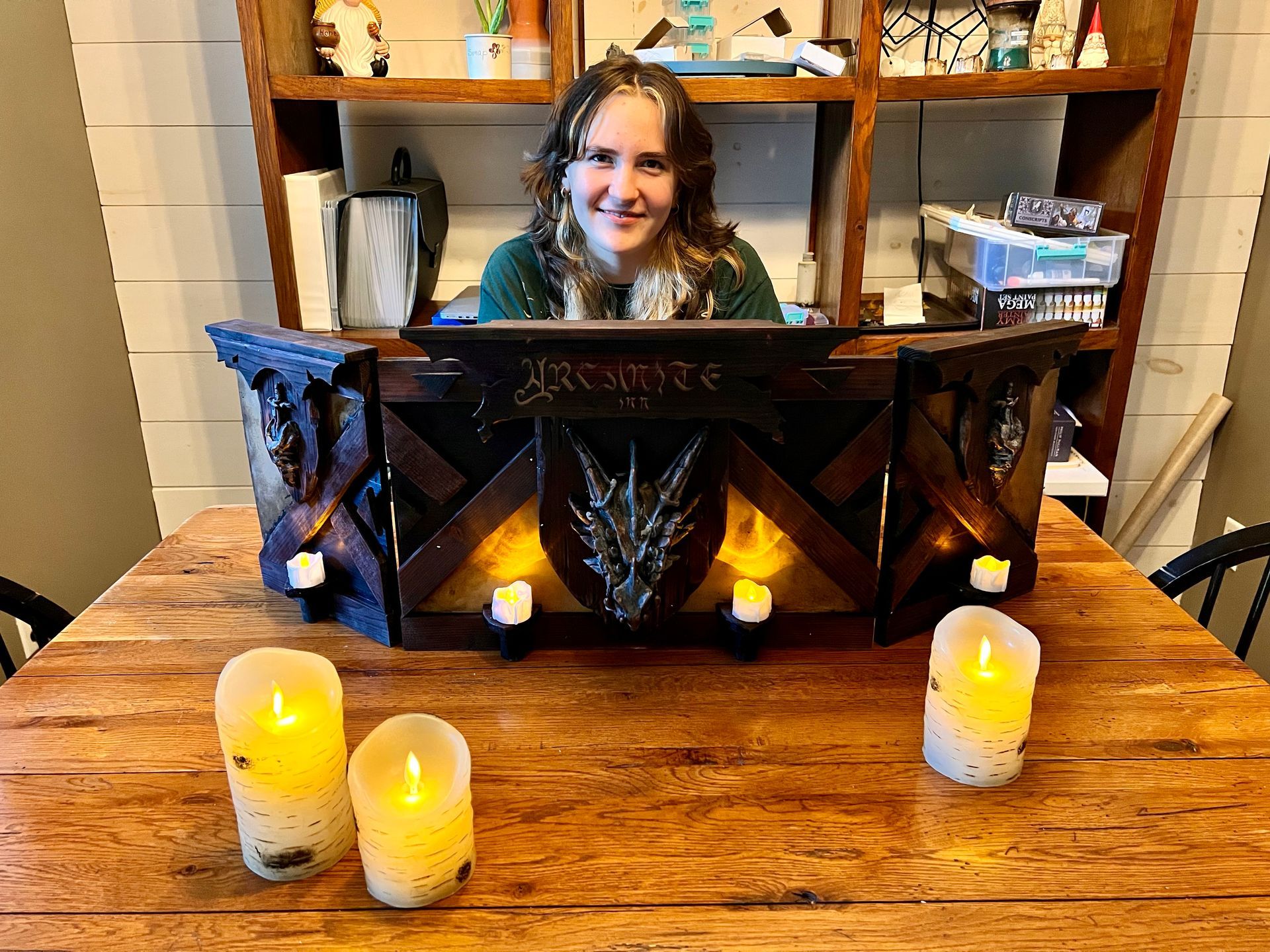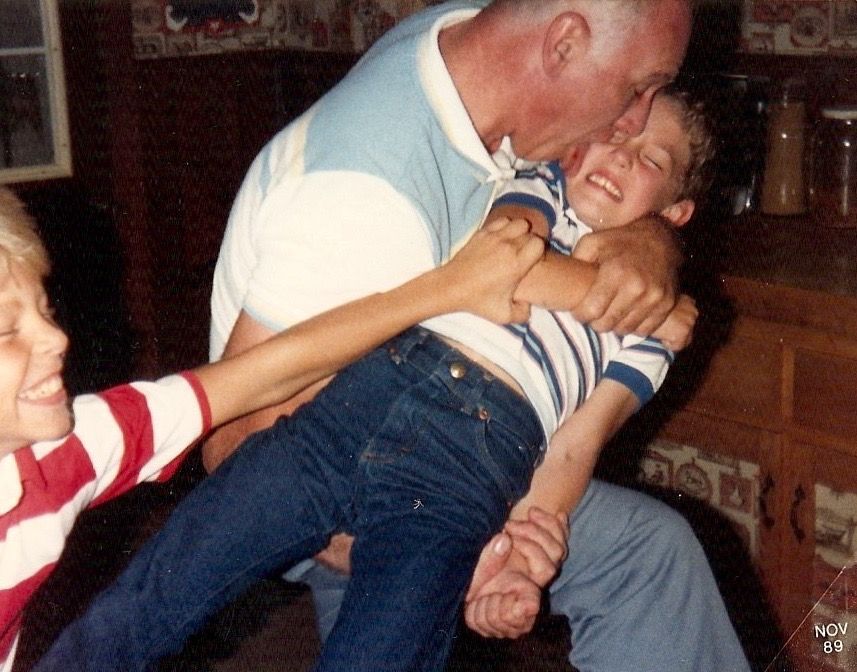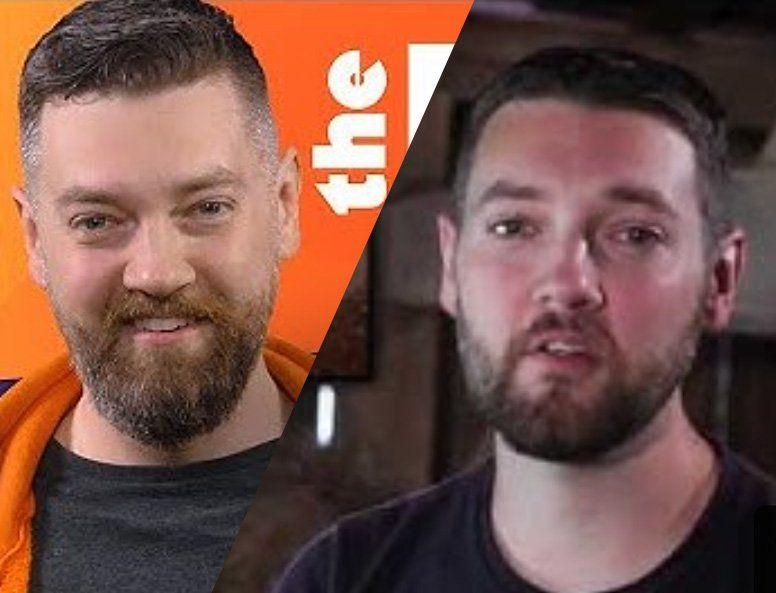D&D as Therapy
How 'Game Mastering' helps my creativity.

If you Google ‘D&D therapy,’ you’ll find most articles are written about the therapeutic powers of playing D&D, but almost nothing about how running a game of D&D might be therapeutic.
Let me start by explaining what today's blog is not. I am not a therapist and am not here to give advice, but hope my exploration of running this game can give you hope and ideas on how you might find fulfillment through this unique storytelling medium. By no means am I an expert Dungeon Master or player of D&D, so these ramblings will never be me telling you how to do something better, and you’ll never hear me say you’re doing it wrong. To the contrary—I hope you’ll be the ones giving me advice!
From 2005 to 2010 I was an active duty Marine—a combat photographer. It was a sweet gig and I loved it. Mostly. After I was honorably discharged, I went to NYU and worked on earning a Masters degree in Film & Television Production.
I had almost zero transition period between my military career and rendering civilian life. If you don’t know, the military is notoriously bad at helping servicemen and women transition back into civilian life.
My first two years at NYU were amazing. Military life translates surprisingly well into film production. There are a lot of similarities with hierarchy, acronyms, inside lingo, crass humor, and being punctual. Simply showing up to class or to a film set a few minutes early every day earned me the nickname “Mr. Punctuality.” It’s surprising how much mileage I got out of that.
By my third year in the program, I was very popular with both students and professors and when I applied to be a Graduate Assistant I was accepted without hesitation. What they don’t tell you about PTSD, especially as you’re transitioning out of the military and need to hear it the most, is your symptoms can take years to manifest.
Unfortunately, unbeknownst to me, this was the point in my life where my PTSD symptoms would start to surface. Additionally, I started to experience muscle pain so severe I couldn’t turn my head—the result of a training accident while fast-rope out of a Sea Stallion helicopter.
For those who don’t know, fast-roping involves sliding down a rope from a helicopter while in flight. The rope is anchored to the ceiling of the helicopter and descends through the “hell hole,” as we call it in the Marines (a square opening in the floor). To successfully fast-rope, you must properly wrap the rope around one leg, over one foot, and between your boots. Control of your speed occurs when you cinch your feet together. Your hands are for balance, not for control.
When it was my turn to drop, I couldn’t quite get the rope wrapped properly around my leg. The impatient Marine behind me, not realizing I was having trouble, decided to give me a helpful push. Zzzzzzzzzzip! Down I fell with only my gloved hands to control me. I can still smell the roasted nylon.
I landed on my right ankle and could feel a shot of electricity shoot up my leg, through my back, and into my head. I dropped like a rock. One of the training officials had to push me out of the way so I wouldn’t be crushing by the next fast-roper.
I was given an ankle brace and some Motrin and deployed a month later.
This would go on to become a chronic experience. In fact I’m experiencing a fit right now as I write this, nine years after it first onset in my third year of NYU.
My biggest PTSD symptom is probably anxiety, but for a person who’d never experienced anxiety before, it was a mystery to me what was happening. I was getting easily irritated—even made one girl cry just by shaking my head in frustration every time she asked a question about some hypothetical scenario we’d never experience. We eventually made nice, but I do think shamefully on myself for how I acted toward my peers in those days.
I was finding it increasingly difficult to follow through on simple tasks, or to ever feel like I’d properly prepared for a class as the Graduate Assistant. As long I remembered where I was supposed to be, my punctuality never wavered. Unfortunately, I was forgetting meetings and just not showing up.
Things got so bad one of my professors, bless her soul, called me into her office and asked, “Are you okay? What’s going on?” I didn’t have an answer. I knew something was wrong because I wasn’t myself. Every week of my life I’d been a joyful person and liked to imagine I was a light in the room. But now I felt I was draining the light from others, sucking away their joy. “I don’t know,” was all I could manage to say.
After NYU things got worse. Depression set in. I was trying to write full-time and make it in Hollywood. After a few meetings with big producers that led nowhere the depression got worse. Things got dark. Real dark. God bless my wife, her patience and her grace feel endless.
For five years she was the soul bread winner. I promised her from the start if she gave me five years in California, if I hadn’t figured it out by then, we could move back home to Ohio. By year three I was a barista at Starbucks. Don’t get me wrong, I love that company, but when you have a Masters degree from the most prestigious film school in the world, being a coffee jockey for lack of options does not help one’s self esteem.
Eventually I did find film-related work at the LA County Museum of Art (LACMA). They had partnered with the LA County Libraries to form a program called Veterans Make Movies. I started as one of the assistants and worked my way up to being a Teaching Artist.
The program was eight weeks long and took part several times a year. Veterans met on weekends and we taught them how to use film as an art form—a therapy.
There were always two Teaching Artists and two assistants. The teachers were always comprised of one military Veteran/filmmaker and one civilian artist who understood the art side of things (both film and traditional).
This was my first time experiencing a world where art could be a therapy, and I have to be honest, it wouldn’t occur to me for several more years what I’d really been exposed to. At the time I was full of myself and thought myself the master when I should have slowed my roll and listened more to the other instructors.
It surprised me how much incredible work came out of those classes in just eight weekends. Here’s a playlist of some of the work my students crafted.
Watch some of the videos here.
Over time I’d slowly lost contact with my childhood friends, even those I call best friends. Two such friends were Josh and Mike. We were in middle and high school together. All three of us attended the same church, pastored by Josh’s dad.
Mike joined the Army and was a huge part of my deciding to join the military. Staying in touch with him was never easy and eventually we stopped trying. Our wives follow each other on Facebook and that was enough to feel we had a connection.
Josh and I had a falling out of sorts. He graciously drove me to New York to hunt for apartments in 2011. On the way home we had a disagreement on politics (nothing ever good comes from a discussion about politics) and simply stopped calling each other. Nothing malicious. It just happened and before you know it seven years go by.
Seven years.
And then one day my wife comes into the room, eyes full of tears. She could barely speak.
“Your friend Mike … He passed away.”
What? How? Where? What is happening? He’s got two kids! He’s not even deployed. The room was spinning.
The first thing I thought to do was text Josh. It’s a shame the death of a friend is what it took to remind me of what’s important in life. And it ain’t politics!
Josh and I rekindled our friendship and I can honestly say if it wasn’t for him, I’d not be writing this blog.
I honestly can’t remember who brought up D&D first, but eventually Josh and I realized we both had a shared love of this game. Mine started in the living room of my childhood best friends when I was a young teenager. Josh’s started while he lived in Florida and he’d visit local game stores to play D&D Adventure League. For that to have any impact on you, you must first know Josh hates people, crowds, leaving the house, and interacting with most sentient life. But D&D had a magical effect on him (no pun intended).
Eventually he moved back to Ohio and to no one’s surprise found a complete lack of a D&D player base in the rural cornfields of Arcanum. Yes, he really lives in a village called Arcanum. Nobody in the town seems to understand how cool a name that is.
Fun fact, when thinking out a name for our company I researched the demonym for Arcanum. There wasn’t one, so I invented one and ARCANITE was born. And now you know the secret (pun intended this time).
Our discovery for a shared love of D&D occurred less than two years ago at this point. For you to understand why that is so significant to me, please note that I like to fixate on things passionately for short periods of time before moving on to something else. For about three or four months I can get really fired up about a given topic for no particular reason. But it’s my favorite thing and all I can focus on for that short period of time.
But D&D has been different. I’ve maintained a consistent love for this game for almost two years! Why? I don’t even think I’m that great at it, if we’re being honest. Not to mention I rarely get to play. And when I do get to play, I’m not a player, but the Dungeon Master—a responsibility most shy away from because it comes with a lot of work. Like, a lot of work.
I don’t have a definitive answer for you, but I think it’s somewhere inside this anecdote. Last month I was visiting good ol’ New York City! And all the friends I’ve made there. One such friend is Dan, a fellow Marine and NYU grad living in Jersey. We got to talking about our PTSD and anxiety. Part of Dan’s treatment involves driving for Lyft. When he’s not able to sleep or having a bad day, he turns on the app and drives.
For Dan, driving Lyft is calming. He enjoys the calming nature of brief conversations with strangers at random hours of the day and night. With Lyft, he’s in control. He can turn the app off when he’s done, or back on when he needs the therapeutic calm of hearing a stranger’s goings-on. Hearing Dan describe what he gets out of Lyft made me realize I was getting the same thing from Dungeon Mastering.
DM prep is whatever I need it to be, whenever I need it to be that. I can prep a game I’ll never play, just to enjoy the act of researching fictional encounters, mapping never before explored dungeons, or deciphering the bewildering texts of an official D&D campaign setting (seriously, why are they so hard to understand?). I can create entire worlds, races, creatures, puzzles, riddles, armor, items, names, cultures, biomes, et al.
All artists need one thing—crave just one thing—feedback. I believe art is sought after when we see how something we’ve created out of thin air is received by someone else. It usually starts with our mother fawning over stick figures in crayon. Hey, what’s that warm feeling on my insides? I like that. If I draw another one I can get that feeling again. And so the cycle continues until we’re impressing total strangers (the real prize).
For me, this is the hardest part about being a filmmaker—the feedback comes too slowly, if ever. In fact, there’s nothing harmful to an artist than negative feedback or harsh criticism. I’ve spent a decade writing screenplays and trying to get them made. How awful would it be to finally get one into production, spend all that time, energy, and money on something that ultimately fails?
With Dungeon Mastering, however, I can develop a small part of a world for players to explore and get realtime feedback during a session. I’ve had sessions I didn’t think went well, and we’ll talk about that more in other blogs, but that’s the addiction for me—wanting to win them back next game.
And that’s where Arcanite Weekly comes in. This is where I’m going to talk it out, feel my way through this unique storytelling medium that’s part writing, part theater, part improv, all creativity. Are you a military Veteran, artist, or filmmaker looking to find a storytelling therapy? Let me know in the comments about your experiences and we’ll work explore together.


